Saturday 8th and Sunday 9th May 2010
“What’s the weather usually like on the Isle of Wight in May?” I asked Mitch from Isle of Wight Sea Kayaking – “In May it’s usually pretty good”, she replied.
And so it was that seven of us from the Club headed over to the Isle of Wight for two days of 4 Star Training armed only with an enthusiasm to learn. Well the weather was definitely not great but do you want perfect conditions when you’re doing your 4 Star Sea Leader Training…? Probably not… ok the weather wasn’t completely terrible but it was too much for certain individuals in the group so they opted for a hotel instead of camping (wimps!).
The new 4 Star Award is a leadership award, it is not a coaching award and it is not suitable for leading beginners or relative novices. That said there are a lot of synergies with coaching. You need to be able to judge the conditions and standard of the group and make appropriate decisions about route planning, pass on sufficient information to help achieve your objectives, and modify plans if the need arises. For instance, a leader needs to have the skill to pass on tips to improve the group’s overall paddling ability and confidence. If the weather is bad and you can’t do the trip you wanted to do – you could head for the pub – or if the opportunity presents itself you can always do a skills session where everyone gets to practice stuff receiving feedback from others.
After receiving a briefing from Owen Burson on the remit of the award he told us the weather forecast for the day (a modest north easterly), and set us to work on a tabletop coastal planning exercise. Splitting into groups we pored over nautical and OS maps desperately trying to remember what we’d previously been taught on the coastal navigation course. A rough plan started to emerge – I say rough, one group decided to opt to stop in a pub, and another group opted for a route which would involve a hell of a walkout (top tip – remember to check “local knowledge”!), I’m pleased to say Miranda and I had the best route proposing a trip which would take us along the south of the island to Whitecliff Bay and back again.
We then headed off to Fort Victoria (near Yarmouth) and split into two groups to plan an open crossing over the Solent to Hurst Castle spit. Our group headed straight for the lighthouse, with the other opting for a slightly different and less direct route – but we all got there safely and after a spot of lunch we were off again. The only problem was the tide conditions had totally changed (wind was now against tide) which made things interesting for group management, and even more interesting when Owen got us to do some skills stuff… After a further skills session, which included the use of various towlines and ways of using them, we finished up for the day and headed back for some much deserved food and drink.
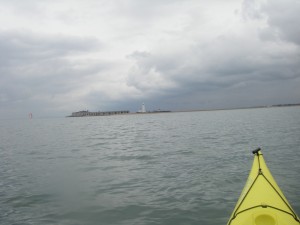
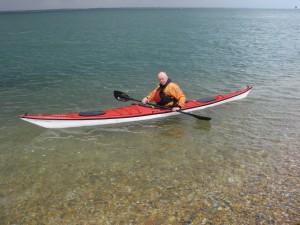
Sunday morning arrived and after another quick tabletop exercise we headed out into Freshwater Bay for leadership training and a bit of rock hopping. However, not before a slight comedy moment which involved John doing a failed roll and swimming, and Jacqui deftly moving in for a deep water rescue which started well but ended with her swimming too as she was unprepared for John’s shift in weight… “Oh well” I thought, I guess I’d better move in to rescue them. Little did I know that only a short amount of time later I would end up swimming myself after get caught off guard being sideways on a steep crashing wave!
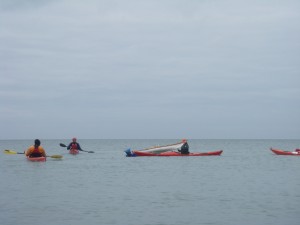
We learnt about CLAP-T in the context of leading on the sea and group management – Communications, Line of Sight, Avoidance is better than cure, Position of Maximum Usefulness, and Top Tips – several of us were already familiar with this concept in the context of whitewater paddling. We also went through the theory behind surf landings (unfortunately there was no real surf around to practice this – something for us to action later).
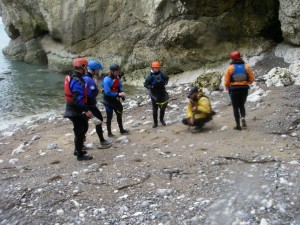
After lunch we went through some incident scenarios on the water with a bit of problem solving thrown in for good measure (e.g. how to patch up a breached hull whilst on the water, dealing with a lost hatch, or paddle) and then a load of wet work involving deep water rescues and self-rescues, as well as the opportunity to practice rolling if people wanted it.
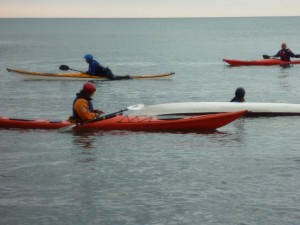
We headed back for a session on safety kit, a debrief and chat about the actual assessment before all going our separate ways back to London. All in all a great weekend and a great training course which is well worth doing – even if you don’t actually end up doing the assessment. Lot’s for us to think about, and put into practice on salt water which is why Chelsea Kayak Club came about in the first place – here’s to our many trips and expeditions and eventually putting putting in for our assessment!
Phil

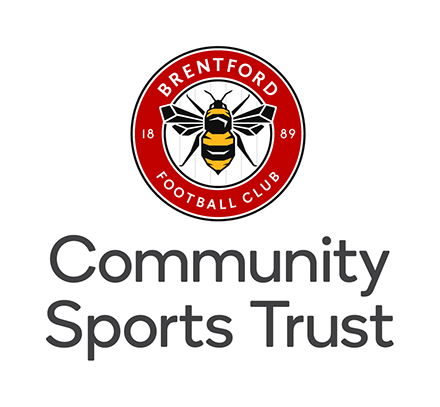
Leave a Reply